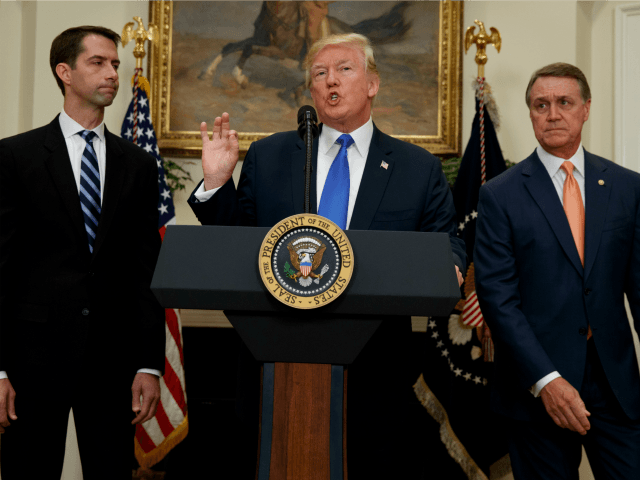On Wednesday, President Trump used the bully pulpit to call on Congress to pass the Reforming American Immigration for a Strong Economy (“RAISE”) Act, sponsored by Senators Tom Cotton (R-Ark.) and David Perdue (R-Ga.). The RAISE Act would shift our legal immigration system away from admitting unskilled immigrants toward admitting highly skilled immigrants, end the diversity visa lottery, reduce the total number of green cards from over a million to about 500,000 per year, and require sponsors of immigrants seeking to become U.S. citizens to reimburse the federal government for welfare benefits the immigrants received. All of these reforms are badly needed.
For too long, our immigration system has imposed huge burdens on the American taxpayer and on the American worker. The RAISE Act reduces the burden on both.
With respect to American taxpayers, the current system forces taxpayers to pay for billions of dollars in welfare benefits given to immigrants. A shocking 51 percent of immigrant headed households consume federal welfare benefits provided by the American taxpayer, compared to only 30 percent of households headed by native-born citizens. The average household headed by an alien (legal or illegal) costs taxpayers $6,234 in federal welfare benefits every year.
That is because the current system favors immigrants with family ties over immigrants with useful skills needed in the American economy. Only 1 in 15 immigrants today is admitted because of economically-beneficial skills that he or she possesses.
As a result, we are admitting hundreds of thousands of unskilled welfare recipients every year. The cost to the American taxpayer is over $103 billion a year in federal welfare benefits alone; that doesn’t include public benefits provided by the states. This situation is unsustainable over the long run. As the Nobel-Prize winning economist Milton Freidman famously put it: “It’s just obvious; you can’t have free immigration and a welfare state.”
The RAISE Act would do a great deal to solve this problem. It would ensure that the majority of immigrants admitted to the United States are highly-skilled and able to support themselves. It would also require sponsors immigrants of who want to become U.S. citizens to reimburse the federal government for all of the means-tested federal benefits received during the alien’s first five years in the United States.
With respect to American workers, the benefits of the RAISE Act are equally clear. For the past two decades, the economy has been flooded with approximately a million, mostly-low skilled, workers every year. That is twice as many were admitted annually in the 1970s and 1980s.
As Harvard’s George Borjas has documented extensively, this influx of unskilled immigrants has displaced American workers and depressed wages in blue collar jobs across the American economy. It should surprise no-one that at a time when immigration numbers are at a historic high, we have seen virtually no wage growth for the past three decades.
The RAISE Act would bring badly-needed relief to the American worker, slowing the influx of competition from alien workers to allow U.S. citizens a better chance of gaining those jobs. It would also use a skills-based point system to ensure that those highly-skilled immigrants who can provide important services and benefits to the U.S. economy gain preference in admission. Aliens with education, extraordinary achievements, high-paying job offers, and entrepreneurial initiative would all be prioritized. A similar point system has worked well in Australia and Canada.
Finally, the RAISE Act would get rid of the outdated and irrational “diversity visa lottery” that annually awards 50,000 visas in a lottery system without any regard to the economic cost the immigrants may impose on American taxpayers and workers. The prize of a green card to enter the United States should never be given away randomly, without regard to the interests of the American people. And that is
And that is the bottom line: the interests of the American people. Our immigration system must serve the interests of the people of the United States, first and foremost. For too long, our system has placed the interests of the aliens over the interests of U.S. citizens. The election of Donald Trump signaled that the American people want to see a change. Enacting the RAISE Act would be a major step in the right direction.
Kris W. Kobach is the elected Secretary of State of Kansas. An expert in immigration law and policy, he coauthored the Arizona SB-1070 immigration law and represented in federal court the 10 ICE agents who sued to stop Obama’s 2012 executive amnesty. President Trump has named him Vice Chairman of the Presidential Commission on Election Integrity. His website is kriskobach.com.

COMMENTS
Please let us know if you're having issues with commenting.